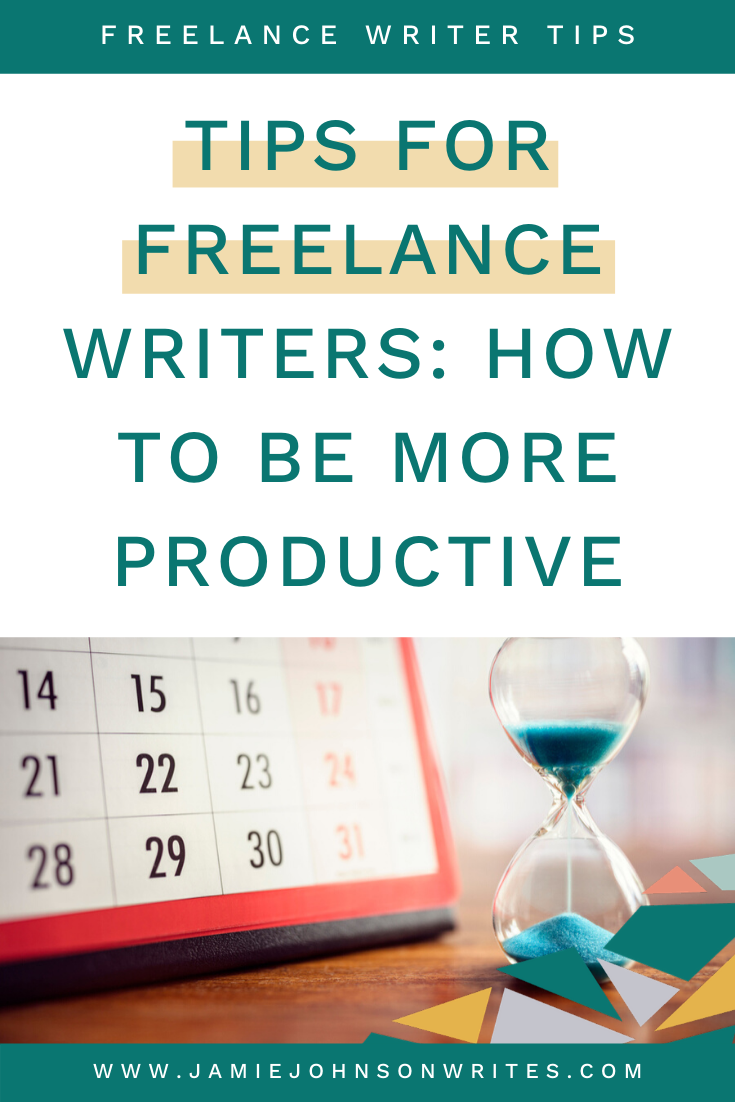Tips for Freelance Writers: How to Be More Productive
Last week, I had kind of a crappy day.
I woke up, did my morning routine, ate breakfast, and took my kids to school. I came home, made coffee, and sat down at my desk at 8:30 AM. I was ready to begin a productive, satisfying day of work.
And that’s where it all went wrong. I was distracted, unfocused, and every sentence I wrote felt like I was trying to swim laps through the mud. It was ugly, slow, and I hated every minute of it.
I did get some work accomplished but definitely didn’t knock off all the items on my to-do list. Unproductive days are frustrating enough in themselves but I think the guilt and worry that follow are even worse.
Suddenly I find myself catastrophizing about everything in my life.
What if I don’t meet my deadlines and every single one of my clients fires me? What if I don’t make enough money this month and we can’t pay our bills? What if I was just kidding myself when I believed that I could actually make a living as a freelance writer?
If it sounds really ridiculous and dramatic, that’s because it is. But I’m guessing I’m not the only one who has found themselves in this scenario.
The Never-Ending Balancing Act
In 2016, when I started working from home as a freelance writer, I embarked on a quest for productivity. And it was really necessary at the time. I had no structure to my days whatsoever and it was incredibly difficult for me to sit down and get anything done.
And I have learned a lot over the past three years.
I learned not to start my day with other people’s opinions, which means I don’t check email, social media, listen to podcasts, or read blog posts in the mornings.
I learned to set time limits for any given task I am working on -- for instance, I have 30 minutes to work on this blog post. That’s it. Giving myself time limits forces me to fully focus and not waste hours of time on one thing.
I’ve learned that exercise and frequent breaks are necessary if I want to be at my very best.
But most of all, I’ve learned that I have to let go of the illusion of perfect productivity because it doesn’t exist. No matter how great my morning routine is or how disciplined I am with my email management I cannot guarantee that I will never again have an unproductive day.
For me, the key is to do my best and then just let go of the results.
How to Let Go of Time Management Guilt
What I have learned is that the guilt that comes from feeling like I’m not making the best use of my time is often worse than the unproductivity itself.
It’s like a domino effect; I don’t get everything checked off of my to-do list so I feel bad about it, which carries into my evening with my family. I don’t enjoy the time spent with my family which makes me feel even more guilty.
See where I’m going with this here? So let’s look at four ways to ditch the time management guilt.
1. Let go of unreasonable expectations
I have found that if I’m feeling a lot of frustration it usually comes back to my expectations. I have a habit of setting unrealistic expectations for myself and then feeling angry or disappointed when I can’t meet them.
For example, I’m a working mom. I don’t have a babysitter or any sort of childcare set up through the school. My husband works full-time so we have an understanding that I handle most school activities.
And honestly, that’s the way I want it. I like the flexibility freelancing provides and how it allows me to work and make a lot of time for my family. But that also means I can’t hold myself to the same standards as someone who doesn’t have kids or someone who has full-time childcare.
2. Focus on your top priorities
One of the things I always have to remember is that my business and my clients aren’t my first priority. I would say God and family always come first.
Of course, this is a constant work in progress because I do have to make money.
To me, focusing on my top priorities don’t necessarily mean I spend all my time on those things. It just means that eventually, a time will come when I have to prioritize one thing over the other.
And if I already know that God and family come first, it makes that decision easier and helps alleviate any guilt I may be tempted to give into.
3. Compare yourself to where you were one year ago
This has been one of the most helpful things for me to constantly keep in mind. I think a lot of people get sucked into the trap of comparing themselves to others, especially those that are at a higher level than them. This obviously leads to tons of discouragement.
I have started focusing on comparing myself to the person I was a year ago. When I think about how much more organized and productive I am today compared to last year, it helps me feel better about myself and motivates me to keep going.
4. Focus on today
I’m not going to beat around the bush here -- being a freelancer is tough. Can I get an “Amen” from my fellow freelancers?
Seriously, though. We have zero job security. We don’t really have that much control over when we get paid so cash flow can be an issue at times. And we have to hustle a lot to make a decent living.
Every month, I start over at zero and it can feel really daunting thinking about the month ahead and what I need to do.
One of the things I have started doing when I start to time travel into the future is to ask myself, “What do I need to do right in this moment?” This helps bring me back to the present and -- most importantly -- focus on the little that I do have control over.




